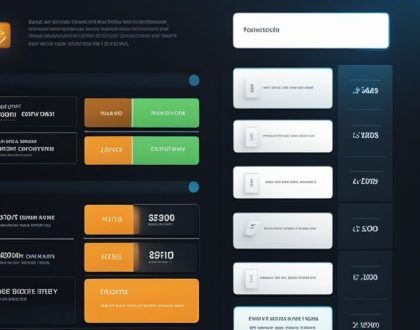Payment Platforms – Choosing the Right Partner

There’s no denying the importance of selecting the right payment platforms for your business. Choosing the right partner can significantly impact your operations, customer satisfaction, and bottom line. With a plethora of options available in the market, it’s crucial to carefully evaluate key factors to ensure you make an informed decision.
Understanding Payment Platforms
Definition and Basic Concepts
To understand payment platforms, we need to grasp the basic concepts underlying their functionality. A payment platform is a technology solution that facilitates the transfer of funds between a payer and a payee. It acts as an intermediary, securely processing transactions and ensuring that the funds reach their intended destination.
Types of Payment Platforms
Regarding payment platforms, there are several types that cater to different needs. Some common categories include traditional banking systems, mobile payment solutions, e-commerce gateways, and peer-to-peer transfer services. Each type offers unique features and benefits, so it’s crucial to choose the right one for your specific requirements.
| Platform | Type |
|---|---|
| Traditional Banking Systems | Banking |
| Mobile Payment Solutions | Mobile |
| E-commerce Gateways | Online |
| Peer-to-Peer Transfer Services | Person-to-person |
Understanding the differences between these payment platforms is vital for making an informed decision. Each type has its own set of advantages and limitations, so it’s crucial to assess your business needs and choose the platform that best aligns with your goals. Assume that the security, transaction fees, and integration capabilities are key factors to consider when selecting a payment platform.
Evaluating Your Business Needs
Assessing Your Payment Volume and Traffic
Volume is a critical factor to consider when evaluating payment platforms for your business. Knowing your average payment volume and traffic will help you determine the type of payment platform that can efficiently handle your transactions. High-volume businesses require robust payment solutions that can process a large number of transactions swiftly and securely. On the other hand, smaller businesses with lower payment volumes may opt for simpler platforms that offer basic payment processing capabilities.
Identifying Your Customers' Preferences
To meet the needs of your customers effectively, it is necessary to identify their payment preferences. Some customers prefer traditional payment methods like credit or debit cards, while others may favor digital wallets or alternative payment options. Understanding your customers’ preferences will help you choose a payment platform that offers the most convenient and preferred payment methods for them. This can enhance customer satisfaction and lead to repeat business.
Security and Compliance
Importance of Secure Transactions
Many payment platforms offer secure transactions as a fundamental feature to protect both businesses and customers from potential fraud. Security in payment transactions is important to safeguard sensitive financial information and prevent unauthorized access to data. A secure payment platform encrypts data to ensure that it’s transmitted safely over the internet, reducing the risk of data breaches and identity theft.
Compliance with Financial Regulations
With the increasing focus on data protection and financial security, it is imperative for payment platforms to comply with financial regulations to operate legally and ethically. Compliance with regulations such as PCI DSS (Payment Card Industry Data Security Standard) ensures that payment platforms adhere to strict data protection requirements, providing a secure environment for financial transactions. Failure to comply with these regulations can result in hefty fines and reputational damage.
The consequences of non-compliance with financial regulations can be severe, leading to legal penalties and loss of trust from customers. It is crucial for payment platforms to stay updated on the latest regulations and ensure that their systems are continuously audited and monitored for compliance. By prioritizing compliance with financial regulations, payment platforms can not only protect themselves from potential legal issues but also build trust with their customers by demonstrating a commitment to security and integrity.
Features and Functionality
Essential Features for Payment Platforms
Not all payment platforms are created equal, and it’s crucial to evaluate the features offered before making a decision. Some of the crucial features to look for in a payment platform include:
- Secure Transactions: Ensure that the platform offers secure encryption and fraud prevention mechanisms.
- Multiple Payment Options: Look for a platform that supports a variety of payment methods to cater to a wider customer base.
- Customizable Checkout: The ability to tailor the checkout process to match your brand and customer preferences is crucial.
- Reporting and Analytics: Access to detailed reporting and analytics can help you track performance and make informed decisions.
Advanced Functionalities to Consider
One of the key considerations when choosing a payment platform is the advanced functionalities that can elevate your business operations. Some advanced features to consider include:
- Platforms Integration: Integration with other business platforms such as CRM systems or accounting software can streamline processes.
- Subscription Management: For businesses offering subscription services, having automated subscription management capabilities can be beneficial.
- Mobile Payments: With the rise of mobile commerce, having a platform that supports mobile payments is crucial for reaching a broader audience.
When selecting a payment platform, it’s important to assess the features and functionalities offered to ensure they align with your business needs and growth objectives.
Integration and Compatibility
Ease of Integration with Current Systems
Compatibility with existing systems is crucial when choosing a payment platform. The ease of integration can streamline operations and reduce the risk of technical issues. Look for a partner that offers APIs or plugins that can seamlessly connect with your current systems, whether it’s an e-commerce platform, accounting software, or CRM system. A smooth integration process will save time and resources, allowing you to focus on growing your business.
Compatibility with Other Business Tools and Services
One of the key factors to consider is how well the payment platform aligns with other business tools and services you use. A payment platform that integrates effortlessly with popular tools like QuickBooks, Shopify, or Mailchimp can enhance your overall efficiency and productivity. This interoperability ensures a cohesive workflow and enhances customer experience by providing a seamless payment process.
With the right payment platform that offers strong compatibility with your existing systems and other crucial business tools, you can create a robust ecosystem that supports your company’s growth and success.
Fees and Costs
Understanding the Fee Structure
Now, when you are considering payment platforms, one of the most crucial aspects to evaluate is the fee structure. Understanding how fees are structured and what they cover is crucial to ensuring you choose the right partner for your business. Common fees to look out for include transaction fees, monthly subscription fees, chargeback fees, and cross-border transaction fees.
Calculating the Total Cost of Ownership
Costs can vary significantly among payment platforms, so it’s vital to calculate the total cost of ownership for each potential partner. In addition to the upfront fees, consider factors such as volume discounts, support costs, integration fees, and any additional features you may need to pay for. By carefully analyzing all these costs, you can make an informed decision that aligns with your business’s financial goals and budget constraints.
Fees
Fees for payment platforms can sometimes be complex and hidden, making it challenging to determine the true cost of using the service. When calculating the total cost of ownership, make sure to factor in any hidden fees that may only become apparent once you start using the platform. This will help you avoid any unpleasant surprises down the line and ensure you have a clear understanding of the financial implications of your choice.
Another key consideration when evaluating payment platforms is the level of customer support they offer. A platform with responsive and knowledgeable customer support can make a significant difference in resolving issues quickly and maintaining a smooth payment process for your business. Be sure to inquire about the support options available and consider the importance of this aspect in your decision-making process.
Support and Reliability
Evaluating Customer Support Services
For businesses looking to choose the right payment platform partner, evaluating customer support services is paramount. Support teams play a critical role in ensuring the smooth operation of payment services. Reliable and responsive customer support can make a significant difference in resolving any issues or concerns that may arise during transactions.
Reliability and Uptime Guarantees
For businesses, reliability is key when it comes to choosing a payment platform partner. Reliability and uptime guarantees ensure that transactions are processed without interruptions, providing a seamless experience for both businesses and customers. Partnering with a payment platform that offers strong reliability and uptime guarantees can help businesses build trust and credibility in the market.
Customer satisfaction is closely tied to the reliability and support offered by a payment platform partner. It is vital for businesses to prioritize platforms that provide exceptional customer support services and reliable uptime guarantees to ensure a positive experience for all parties involved.
Making the Decision
Comparing Shortlisted Payment Platforms
Any business looking to integrate a new payment platform must carefully evaluate the options available to make an informed decision. Comparing shortlisted platforms involves analyzing various factors, such as fees, transaction processing times, security features, customer support availability, and integration capabilities. By creating a detailed comparison table, you can easily identify which platform aligns best with your business needs and future goals.
| Factors to Consider | Platform A |
| Fees | Competitive rates with transparent fee structure |
| Security Features | Advanced encryption and fraud detection tools |
| Customer Support | 24/7 support via multiple channels |
| Integration Capabilities | Easy integration with existing systems |
Pilot Testing and Feedback Gathering
Shortlisted platforms should undergo pilot testing within the business environment to assess their functionality and user experience. During this phase, gather feedback from internal stakeholders and select customers to identify any issues or areas for improvement. This feedback will be instrumental in making a final decision on which payment platform to partner with for the long term.
Comparing the performance of each platform during the pilot testing phase will provide valuable insights into their suitability for your business. Identifying any technical glitches, user experience challenges, or security concerns will enable you to address these issues before fully committing to a particular platform. Make sure to involve key stakeholders in the feedback gathering process to gain diverse perspectives on the platform’s performance.
To wrap up
As a reminder, choosing the right payment platform partner is a crucial decision for your business. By considering factors such as security measures, costs, integration options, and customer support, you can make an informed choice that aligns with your specific needs and goals. Taking the time to research and compare various payment platforms will ensure that you select a partner that not only meets your current requirements but also supports your future growth and success.
Ultimately, the right payment platform can streamline your operations, enhance the customer experience, and improve your bottom line. By partnering with a reliable and trustworthy payment service provider, you can focus on running your business while trusting that your transactions are secure, efficient, and optimized for success.
FAQs:
What is a payment platform?
A payment platform is a technology solution facilitating fund transfers between payers and payees, ensuring secure transactions.
What types of payment platforms are available?
Common types include traditional banking systems, mobile payment solutions, e-commerce gateways, and peer-to-peer transfer services.
How do I assess my business needs for selecting a payment platform?
Consider factors like payment volume, customer preferences, security requirements, and integration capabilities.
What are the essential features to look for in a payment platform?
Key features include secure transactions, multiple payment options, customizable checkout, and robust reporting and analytics.
Why is customer support important when choosing a payment platform?
Responsive and knowledgeable customer support can resolve issues quickly, ensuring a smooth payment process for your business.
Recommended Posts

Payment Integration – A Technical Overview
July 3, 2024

The Ethical Dimensions of iGaming Licensing
July 2, 2024

Licensing Requirements for Online Casinos
July 2, 2024




